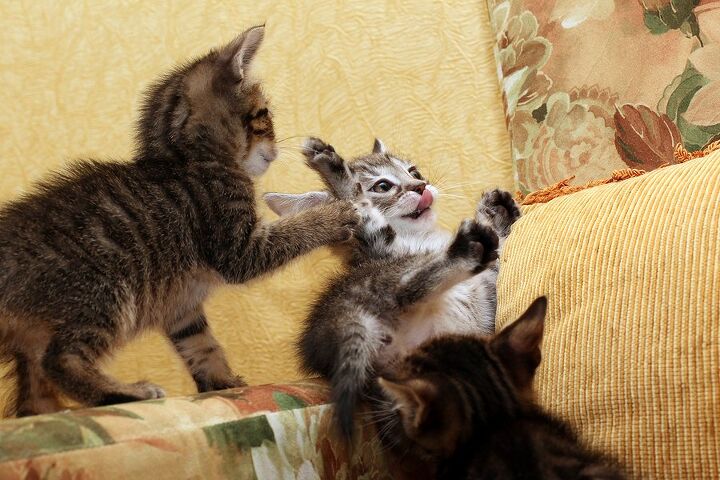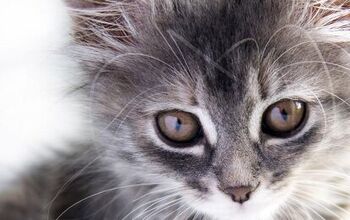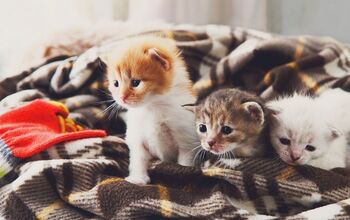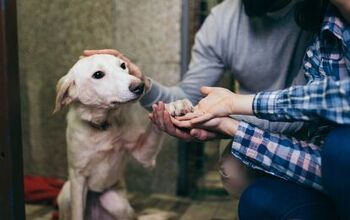How to Kitten Proof Your Home

Kittens are high-energy pets who tend to get themselves into just about everything in your home, crawling low and climbing high as they search and attempt to destroy whatever gets in their path.
To a kitten, dangerous, delicate, and expensive objects can be viewed as toys. Before your new fur baby joins the family, it’s a great idea to take steps to kitten proof your home to keep her out of trouble and out of harm’s way.
Related: How to Bond with Your New Kitten
Remove Potentially Hazardous Objects
There are a variety of seemingly harmless objects around your harm that could actually cause harm to a small kitten. Thread, ribbons, plastic bags, dental floss, strings, yarn, rubber bands, hair ties, cat toys with strings, and even the cords that hang from your window treatments are just a few examples of objects that can serve as playthings but that can also lead to strangulation and choking. Your kitten may also end up swallowing these, which can lead to a deadly obstruction in the intestines.
Remove potentially dangerous objects from your kitten’s environment by storing them away in an area that she can’t access. Tie the cords on window treatments, and only allow your cat to play with potentially dangerous toys, such as wands with strings, when you’re there to supervise and lead the way.
Avoid Electrocution and Fire
Your kitten is likely to find your electrical cords and start chewing away, and this alone could kill her, as well as potentially cause a fire. To prevent accidents, organize and tuck away electrical cords or cover them with thick, chew-proof plastic casing. If your kitten is teething, purchase some toys specifically designed to help her chew in a safe manner until she feels better.
It’s also a good idea to not light candles when your kitten is around because she could knock them over and cause a fire. Either place them in a high, inaccessible area, or just avoid having open flames anywhere in your home.
Related: The Stages of Kitten Development
Put Medications and Cleaning Products Away
Medications and cleaning products may contain ingredients that are toxic to felines. First off, only give your kitten medications that are prescribed to her by her veterinarian. And when it’s time for you to take medicine, make sure you don’t drop any on the floor where your kitten can accidentally ingest it. Pick up any pills that you drop, make sure all bottles are closed tightly, and store the bottles in a cabinet that your kitten can’t access instead of than leaving them on the countertop.
In the same way that you carefully close and store medications, you should do the same with cleaning products. When using these products, especially if you have to spray a product and let it sit for a few minutes, make sure your kitten is kept out of the area.
Remove Toxic Plants and Pesticides from Your Home
There are many common houseplants that are toxic to felines, and kittens really enjoy chewing on plants. Castor beans, rhododendrons, sago palms, lilies, and oleander are just a few examples of some of the many dangerous plants that people may bring into their homes when they have cats.
In addition to keeping certain plants out of your home, you should also get rid of things like potpourri that your kitten might be tempted to chew on, as scented oils may be deadly when consumed by cats.
Also, avoid using harsh pesticides and opt for natural alternatives so that your kitten won’t be exposed to the toxins that can lead to illness.
Keep the Toilet Lid Closed
If you don’t make it a habit of keeping your toilet lid down, you should start as soon as you bring your kitten home. Kittens that jump into the toilet when you aren’t around can drown. And if you use chemical-based cleaners in your toilet, your kitten may also be poisoned if she ingests the water.
Always Know Where Your Kitten Is
Kittens like to hide quite a bit, so try to always have an idea of where your kitten is. Because they’re so small, they can easily get stuck somewhere, and even your furniture can be hazardous. So before you open or close your recliner, as an example, make sure your kitten isn’t under there.
A little bit of common sense goes a long way when it comes to keeping your new kitten safe. Before you know it, she’ll be a full-grown adult who isn’t as energetic and knows her boundaries. But in the meantime, kitten proof your home to keep her happy and healthy.

Lisa Selvaggio is a freelance writer and editor, and our resident cats-pert, with certifications in pet nutrition and pet first aid. She enjoys producing content that helps people understand animals better so they can give their pets a safe and happy home.
More by Lisa Selvaggio























